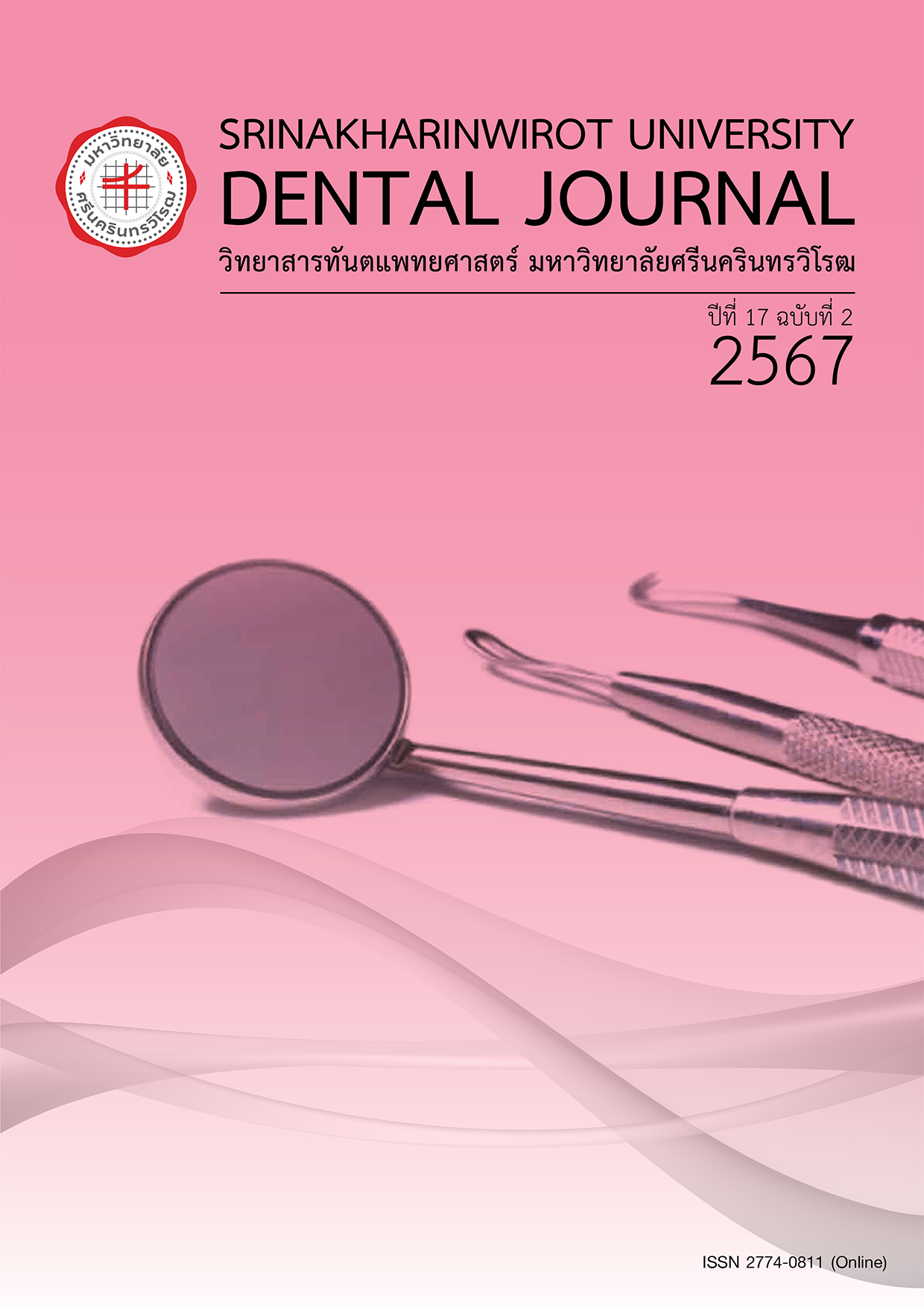ความสัมพันธ์ระหว่างปัจจัยส่วนบุคคล การตระหนักรู้ส่วนบุคคล เรื่องโภชนาการกับพฤติกรรมการบริโภคอาหารของผู้สูงอายุ ภาคตะวันออกของไทย
Correlation Between Personal Factors of Nutritional Awareness and Food Consumption Behavior among Older Adults in the Eastern Region of Thailand
Keywords:
ปัจจัยส่วนบุคคล, การตระหนักรู้เรื่องโภชนาการ, พฤติกรรมการบริโภคอาหาร, ผู้สูงอายุ, Personal factor, Nutritional awareness, Food consumption behavior, Older adultsAbstract
วัตถุประสงค์: เพื่อศึกษาความสัมพันธ์ระหว่างปัจจัยส่วนบุคคล การตระหนักรู้ส่วนบุคคลเรื่องโภชนาการ และพฤติกรรมการบริโภคอาหารของผู้สูงอายุในจังหวัดภาคตะวันออกของไทย วัสดุและวิธีการ: โดยใช้แบบสอบถาม ประกอบด้วยสามส่วน ได้แก่ ข้อมูลส่วนบุคคล การตระหนักรู้ส่วนบุคคลเรื่องโภชนาการ และพฤติกรรมการบริโภคอาหาร โดยการสุ่มเลือกผู้สูงอายุจำนวน 825 คนที่มีอายุ 60 ปีขึ้นไปภาคตะวันออกของไทย และทำการวิเคราะห์ข้อมูลโดยใช้สถิติเชิงพรรณา Independent T-Test และ ความแปรปรวนทางเดียว (One-Way ANOVA) ร่วมกับสหสัมพันธ์แบบเพียร์สัน ด้วยระดับความเชื่อมั่นที่ร้อยละ 95 ผลการศึกษา: ผู้สูงอายุจำนวน 825 คน ช่วงอายุตั้งแต่ 61 ปี ถึง 84 ปี อายุเฉลี่ย 70.30 ปี โดยเป็น เพศชาย ร้อยละ 45.50 เพศหญิงร้อยละ 55.50 พบว่า ปัจจัยส่วนบุคคล ได้แก่ เพศ (p < 0.05) ระดับการศึกษา (p = 0.00) รายได้ของครอบครัว (p = 0.00) และการอยู่ร่วมกับสมาชิกในครอบครัว (p = 0.00) มีความสัมพันธ์ทางบวกกับพฤติกรรมการบริโภคอาหาร รวมถึงการตระหนักรู้ส่วนบุคคลเรื่องโภชนาการ ทั้งสามหัวข้อ ได้แก่ การตระหนักรู้ทางอารมณ์ การประเมินตนเองอย่างแม่นยำ และความมั่นใจในตนเอง มีความสัมพันธ์ทางบวกกับ พฤติกรรมการบริโภคอาหารอย่างมีนัยสำคัญ (r = 0.16, 0.24 และ 0.29, p = 0.00) สรุปผล: ปัจจัยส่วนบุคคล และการตระหนักรู้ส่วนบุคคลเรื่องโภชนาการ มีความสัมพันธ์ในทางบวกกับพฤติกรรมการบริโภคอาหารของผู้สูงอายุในภาคตะวันออกของไทยอย่างมีนัยสำคัญ Abstract Objective: This study aims to examine the relationship between personal factors, nutrition awareness, and food consumption behavior among older adults in the Eastern part of Thailand. Materials and Methods: A structured questionnaire was utilized, comprising three sections covering personal information, nutrition awareness, and food consumption behavior. The sample consisted of 825 participants aged 60 years and above. Descriptive statistics, independent t-tests, one-way analysis of variance (ANOVA), and Pearson’s correlation were employed to analyze the data at a 95% confidence level. Results: The study included 825 older adults with an average age of 70.30 years, ranging from 61 to 84 years. Among the participants, 45.50% were male and 55.50% were female. The findings indicated significant positive correlations between gender (p < 0.05) educational level (p = 0.00), family income (p = 0.00), and living with family members (p = 0.00), with food consumption behavior. Furthermore, emotional awareness, accurate self-assessment, and self-confidence were significantly associated with food consumption behavior among the older adult population. (r = 0.16, 0.24 and 0.29, p = 0.00) Conclusion: Personal factors and personal awareness of nutrition have a significant positive relationship with the food consumption behavior of the older adults in the eastern region of ThailandDownloads
References
National Statistical Office of Thailand. Statistic of Older Adults in 2007 [Internet]. ฺBangkok: National Statistical Office; 2007 [cited 2021 Sep 20] [Available from: http://webhost. nso.go.th/nso/home/images/68/old.doc. (in Thai).
Wang X, Ouyang Y, Liu J, Zhu M, Zhao G, Bao W, et al. Fruit and vegetable consumption and mortality from all causes, cardiovascular disease, and cancer: systematic review and doseresponse meta-analysis of prospective cohort studies. BMJ. 2014:349:g4490. doi: 10.1136/bmj.g4490.
Nakwjit B. Psycho-social fators related to self- care behavior and happiness of the senior citizen club members in the hospitals under medical service department, Bangkok metropolis. [Master Thesis, ( Applied Behavioral Science Research)]. Bangkok: Srinakharinwirot University; 2008.
Rungsiyanont S, Sakoolnamarka SS. Coorelation between nutrition awareness and food consumption behaviors of elderly in Samutprakarn province. J Public Health Epidemiol. 2023;15(2):55-63.
Sakoolnamarka SS, Lawprasert K, Larpjitkusol S, Srikan T, Chuayboo S, Rungsiyanont S. Correlation Between Nutritional Awareness and Food Consumption Behaviors of The Elderly in Nakhon Nayok Province. SWU Dent J. 2021;14(1):64-79.
Healthy Diet for Elderly. Potential development and enhancements in nutritional skills for lifelong care of the elderly and exchange knowledge with network partners [Internet]. elderly cluster, Bureau of Nutrition, Department of Health; 2017 [cited 2023 Dec]. Available from: https://nutrition2.anamai.moph.go.th/th/elderly-doc/download. (in Thai).
Goleman D. Emotional intelligence. New York: Bantam Books Publishing; 1995.
Kasempolkoon A. Eastern Thai Cuisine as an Intangible Cultural Heritage: The Harmony of Multicultural Society and Identity Formation in the Gastronomy Tourism. [Internet] Bangkok: In: 2nd Museums and Cultural Heritage Conference, Thammasat University; 2022 [cited 2023 Sep]. Available from: https://museum.socanth.tu.ac.th. Accessed: 2023-09-15. (in Thai).
Office of the Royal Society. "Geographic regionalization" [Internet]. Bangkok: Office of the Royal Society; 2015 [cited 2023 Sep]. Available from: http://legacy.orst.go.th. (in Thai).
López-Gimenez R, Montero P, Mora Urda AI, Collazos J. Eating Habits, Health and Gender in the Elderly. Eur J Investig Health Psychol Educ. 2013;4:31-40. doi:10.3390/ejihpe 401000.
Masella R, Malorni W. Gender-related differences in dietary habits. Clin Manag Issues. 2017;11. doi:10.7175/cmi.v11i2.1313.
Rippin HL, Hutchinson J, Greenwood DC, Jewell J, Breda JJ, Martin A, et al. Inequalities in education and national income are associated with poorer diet: Pooled analysis of individual participant data across 12 European countries. PLoS One. 2020;15(5):e0232447. doi:10.1371/journal.pone.0232447.
Sugisawa H, Nomura T, Tomonaga M. Psychosocial mediators between socioeconomic status and dietary habits among Japanese older adults. J Nutr Health Aging. 2015;19(2):130-6. doi: 10.1016/j.jeoa.2021.100307.
Han Y, Li S, Zheng Y. Predictors of nutritional status among community-dwelling older adults in Wuhan, China. Public Health Nutr. 2009;12(8):1189-96.
Hanna KL, Collins PF. Relationship between living alone and food and nutrient intake. Nutr Rev. 2015;73(9):594-611.
Chang L, Fujin Y, Zhigang X, Xu T. Do Living Arrangements Matter? Evidence from Eating Behaviors of the Elderly in Rural China. J Econ Ageing. 2021;19:100307. doi: 10.1016/j.jeoa. 2021.100307.
Shahar S, Vanoh D, Mat Ludin AF, Singh DKA, Hamid TA. Factors associated with poor socioeconomic status among Malaysian older adults: an analysis according to urban and rural settings. BMC Public Health. 2019;19(Suppl 4):13. doi: 10.1186/s12889-019-6866-2.
Aure CF, Kluge A, Moen A. Promoting dietary awareness: Home-dwelling older adults’ perspectives on using a nutrition application. Int J Older People Nurs. 2020;15:e12332. doi:10.1111/opn.12332.
Sakoolnamarka SS, Rungsiyanont S. Correlation between Nutritional Awareness and Food Consumption of the Elderly in the Central of Thailand: A Cross-Sectional Study. Ann Dent Oral Health. 2023;6(2):1051.
Downloads
Published
How to Cite
Issue
Section
Categories
License
Copyright (c) 2024 Srinakharinwirot University Dental Journal (E-ISSN 2774-0811)

This work is licensed under a Creative Commons Attribution-NonCommercial-NoDerivatives 4.0 International License.
เจ้าของบทความต้องมอบลิขสิทธิ์ในการตีพิมพ์แก่วิทยาสาร โดยเขียนเป็นลายลักษณ์อักษรแนบมาพร้อมบทความที่ส่งมาตีพิมพ์ ตามแบบฟอร์ม "The cover letter format" รวมทั้งต้องมีลายมือชื่อของผู้เขียนทุกท่านรับรองว่าบทความดังกล่าวส่งมาตีพิมพ์ที่วิทยาสารนี้แห่งเดียวเท่านั้น




